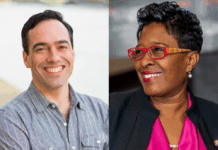
(GA Recorder) — A Fulton County judge ruled Thursday that 17 defendants, including former President Donald Trump, will be tried separately from co-defendants Sidney Powell and Kenneth Chesebro, who are scheduled to go on trial on Oct. 23 for allegedly trying to overturn the 2020 presidential election in Georgia.
On Thursday, Superior Court Judge Scott McAfee noted in his order the logistical challenges of meeting the demands of the Fulton County District Attorney’s Office to have all 19 defendants tried at the same time next month. McAfee’s ruling means that co-defendants Powell and Chesebro are scheduled for an Oct. 23 hearing, the beginning installment in an expected marathon trial that prosecutors anticipate will eventually involve 150 witnesses taking the stand over the course of four months.
Earlier this week, Fulton County District Attorney Fani Willis defended holding joint trials for the 19 defendants as being an efficient use of resources since prosecutors plan to present the same evidence and witnesses for every defendant’s case.
McAfee wrote Thursday that the downtown Atlanta courtroom was not large enough to hold all 19 defendants, their attorneys, and the team of state prosecutors at the same time.
McAfee rejected requests from attorneys representing Chesebro and Powell to have their cases tried separately. Their attorneys have said they wanted to sever the co-defendants’ trials in order to protect their clients from being unfairly tainted by unrelated evidence.
In his ruling, McAfee said he considered the impact of a months-long trial that will result in “sidelining dozens of defense counsel from handling other cases and preventing this court — and quite likely most colleagues — from managing the rest of the docket.
“Relocating to another larger venue raises security concerns that cannot be rapidly addressed” McAfee said.
No dates have been set for the trials of 2024 Republican presidential candidate frontrunner Trump and 16 of his co-defendants, all of whom were charged on Aug. 14 under Georgia’s RICO Act (Racketeer Influenced and Corrupt Organizations). Fulton prosecutors have argued the state’s RICO law doesn’t require each defendant to have direct ties or knowledge of one another in order to be tried together.
The ruling by McAfee leaves the door open for other defendants’ trials to be separated.
Willis initially filed a request that Trump and his 18 co-defendants stand trial in March, or roughly seven months after handing up a 91-count indictment that accuses the 45th president of being one of the ringleaders in the 2020 election conspiracy to overturn democratic President Joe Biden’s Georgia victory.
Chesebro and Powell requested a speedy trial, which under Georgia law would require proceedings to begin no later than Nov. 6.
Lawyers for several defendants, including Trump and his personal lawyer Rudy Giuliani, have claimed that a short turnaround for the complex case will hinder their ability to mount a strong defense.
Trump and Giuliani face 13 felony counts, including an overarching charge of violating Georgia’s racketeering law, which is modeled after a federal law designed to target mafia leaders and other criminal enterprises.
Fulton prosecutors allege that Chesebro and Powell were involved in the conspiracy to unlawfully disrupt Georgia’s election system, even if their methods of doing so varied.
The charges against Chesebro are related to his role in developing the strategy for implementing false GOP electors in Georgia and several other states who would cast votes in favor of Trump.
Powell faces several felony counts for allegedly helping hire a team of computer forensic experts involved in a Coffee County voting system breach that occurred weeks after the 2020 election.
Prosecutors, defense attorneys spar over grand jury access
In a 90-minute court hearing on Thursday, state attorneys argued against Powell’s and Chesebro’s lawyers’ request that McAfee allow them to contact grand jurors about voluntary interviews.

According to Chesebro’s attorney, Scott Grubman, the interviews will help determine whether prosecutors interfered with the jury’s decision.
“While we cannot ask the grand jurors about what happened in deliberations, (but) we can ask was there anyone other than the grand jury in the deliberations,” the Dunwoody attorney said.
“The reason we filed this motion is to be above board and make sure everything is out there in the open.”
Fulton prosecutor Daysha Young expressed concern that defense attorneys might inquire about the secret grand jury’s deliberations.
“While we cannot ask the grand jurors about what happened in deliberations, (but) we can ask was there anyone other than the grand jury in the deliberations,” the Dunwoody attorney said.
“The reason we filed this motion is to be above board and make sure everything is out there in the open.”
Young also remarked that grand jurors may not be comfortable being asked to continue participating in the high-profile case after already having their personal information posted online.
“They’ve experienced doxxing threats. They’ve contacted our office because of safety concerns,” Young said. “We’ve had to contact law enforcement agencies all over Fulton to make sure these jurors are safe.”
Powell and Chesebro’s attorneys were instructed by McAfee to submit to the court a list of questions they would ask the grand jurors.
“I certainly haven’t found anything in Georgia law that says no one is allowed to talk to the grand jury,” McAfee said. “I’m with you that deliberations are a hard stop.”






